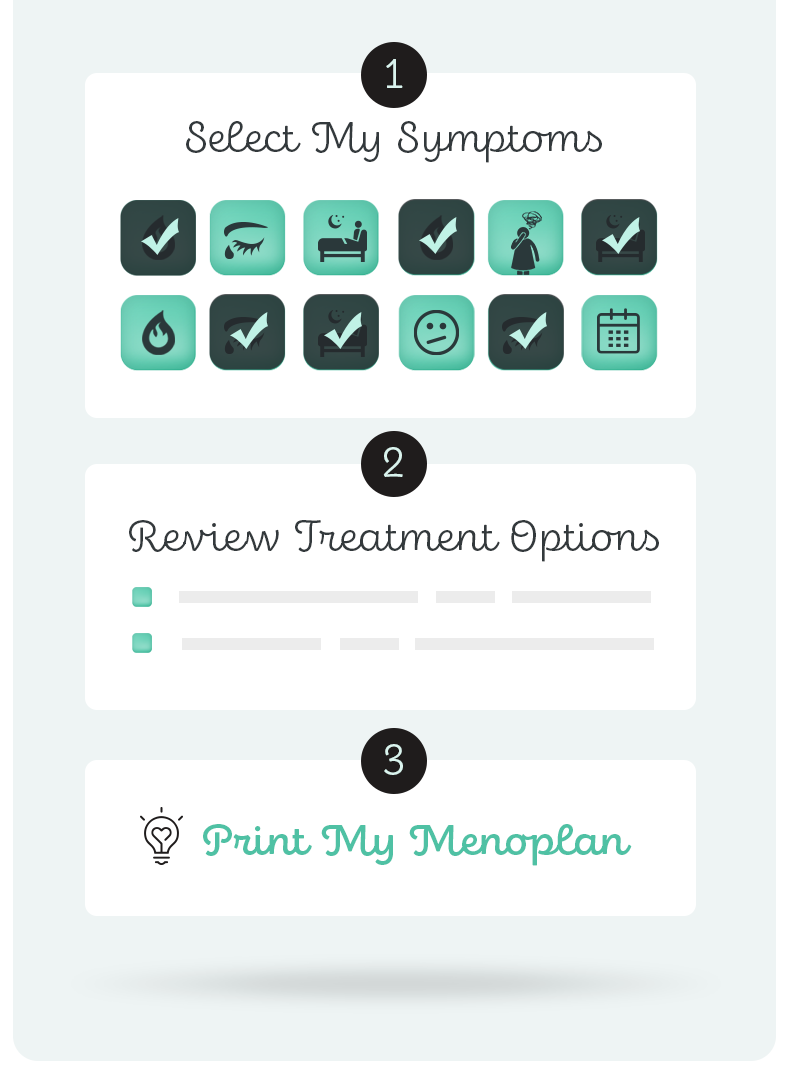MOOD, ANXIETY, & DEPRESSION
Symptoms
WHAT IS IT?
Women are more likely to have depressed mood, major depression, and/or anxiety during perimenopause. While it is normal to occasionally feel down or anxious, or have a moody day, major depression can significantly interfere with your life.
Symptoms of depression can include:
- loss of interest or pleasure in your activities,
- weight loss or gain,
- trouble getting to sleep or feeling sleepy during the day,
- feeling restless and agitated or else very sluggish and slowed down physically or mentally,
- being tired and without energy,
- feeling worthless or guilty,
- trouble concentrating or making decisions,
- a sense that something bad is going to happen,
- a sense of hopelessness,
- thoughts of suicide, and
- inability to take care of yourself.
If you have many of these symptoms for two or more weeks, you may have major depression.
Anxiety symptoms include:
- excessive worrying that interferes with daily functioning,
- agitation,
- restlessness,
- fatigue,
- difficulty concentrating,
- irritability,
- tense muscles,
- panic attacks, and
- trouble sleeping.
WHAT’S HAPPENING TO MY BODY?
We are not completely sure why the risk for depression increases during the menopause transition, but hormone fluctuations likely play a role. Night time hot flashes, or night sweats, and insomnia can contribute to mood changes as well.
WHAT TO EXPECT
Women who are most at risk are those with a history of depression. But even women who have not been depressed before are about 3 times more likely to develop depression during the menopause transition compared to premenopause. Poor sleep, stress, negative life events, higher body mass index, smoking, younger age at menopause and African American race increase this risk.
Treatments that are inappropriate or have not been studied for this symptom are not listed.
Please scroll beyond “References” to access more resources if you are browsing on mobile or tablet
Amin Z, Canli T, Epperson CN. Effect of estrogen-serotonin interactions on mood and cognition. Behav Cogn Neurosci Rev. 2005; 4:43–58. doi:10.1177/1534582305277152. PMID: 15886402.
Freeman EW, Sammel MD, Lin H, Nelson DB. Associations of hormones and menopausal status with depressed mood in women with no history of depression. Arch Gen Psychiatry. 2006; 63:375–382. doi:10.1001/archpsyc.63.4.375.PMID: 16585466.
Freeman EW, Sammel MD, Lin H. Temporal associations of hot flashes and depression in the transition to menopause. Menopause. 2009; 16:728–734. doi:10.1097/gme.0b013e3181967e16. PMID: 19188849.
Kravitz HM, Schott LL, Joffe H, Cryanowksi JM, Bromberger JT. Do anxiety symptoms predict major depressive disorder in midlife women? The Study of Women’s Health Across the Nation (SWAN) Mental Health Study (MHS).Psychol Med. 2014; 44(12):2593–2602. doi:10.1017/S0033291714000075. PMID: 24467997.
Liska D, Mah E, Brisbois T, Barrios PL, Baker LB, Spriet LL. Narrative Review of Hydration and Selected Health Outcomes in the General Population. Nutrients. 2019; 11(1):70. https://doi.org/10.3390/nu11010070
Mocking RJ, Harmsen I, Assies J, Koeter MW, Ruhé HG, Schene AH. Meta-analysis and meta-regression of omega-3 polyunsaturated fatty acid supplementation for major depressive disorder. Transl Psychiatry. 2016 Mar 15;6(3):e756. doi: 10.1038/tp.2016.29. PMID: 26978738; PMCID: PMC4872453.
Morrison MF, Kallan MJ, Ten Have T, Katz I, Tweedy K, Battistini M. Lack of efficacy of estradiol for depression in postmenopausal women: a randomized, controlled trial. Biol Psychiatry. 2004; 55:406–412. doi:10.1016/j.biopsych.2003.08.011. PMID: 14960294.
Morssinkhof MWL, van Wylick DW, Priester-Vink S, van der Werf YD, den Heijer M, van den Heuvel OA, Broekman BFP. Associations between sex hormones, sleep problems and depression: A systematic review. Neurosci Biobehav Rev. 2020 Nov;118:669-680. doi: 10.1016/j.neubiorev.2020.08.006. Epub 2020 Aug 31. PMID: 32882313.
Santoro N, Epperson CN, Mathews SB. Menopausal Symptoms and Their Management. Endocrinol Metab Clin North Am. 2015 September ; 44(3): 497–515. doi:10.1016/j.ecl.2015.05.001. PMID: 26316239.
Schmidt PJ, Haq N, Rubinow DR. A longitudinal evaluation of the relationship between reproductive status and mood in perimenopausal women. Am J Psychiatry. 2004; 161:2238–2244. doi:10.1176/appi.ajp.161.12.2238. PMID: 15569895.
Authors: Drs. Hadine Joffe, Katherine Newton, & Leslie Snyder. Last reviewed: July, 2021
SHOULD I TALK WITH MY HEALTH CARE PROVIDER ABOUT ANXIETY OR DEPRESSION?
Use our tools to find out



